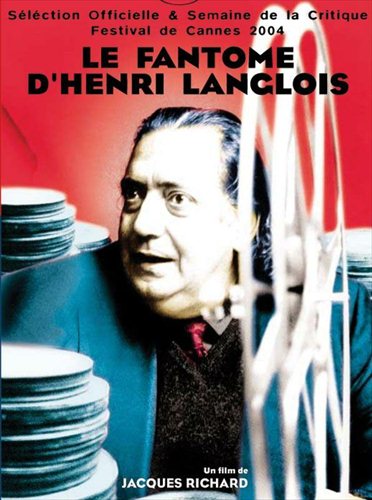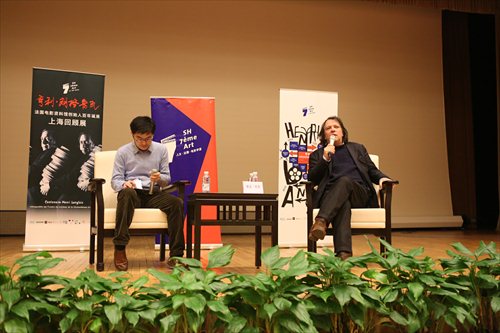Phantom of the Cinémathèque
Retrospective of Henri Langlois, film historian and archivist
"He never shot a frame, but was a great maker of movies," Jean-Luc Godard, the French New Wave film director, said of Henri Langlois (1914-77), the founder of one of the world's largest archives of film and film-related objects-Cinémathèque Française.
"Langlois was a man who was afraid of the camera all his life, but he was an indispensable character in French and world cinema history," French film director Jacques Richard told the Global Times. When Langlois was still at the Cinémathèque Française in the early 1970s, Richard was always beside him as his assistant.
"At that time, Cinémathèque Française served as an ambassador hall for film directors from different places of the world, a clubhouse and film school for filmgoers. Everyday there was really a film feast," Richard recalled.

Posters for the film Le Fantome d'Henri Langlois and the centenary of his birth in Shanghai Photos: Courtesy of the Institute of World Film at Shanghai Normal University
Looking back
A retrospective film exhibition celebrating the 100th anniversary of Langlois's birth is being held in Shanghai until January 31.
Titled Centenaire Henri Langlois, the event is co-organized by the Consulate General of France in Shanghai and the Institute of World Film at Shanghai Normal University. It will screen works by living directors dedicated to the memory of Langlois, including three films by Richard: Langlois Monumental (1991), Le Musée du Cinéma Henri Langlois du Palais de Chaillot (1997), and Le Fantome d'Henri Langlois (2004).
Films by French New Wave directors Jean Vigo, Jean-Luc Godard and FranÇois Truffaut, who were friends with Langlois, will also be screened. The screening venues include Shanghai Film Art Center, the Art Theatre in China Art Museum, and MoCA Shanghai.
Richard visited Shanghai last week as a guest of the event and gave several lectures about Langlois.

Posters for the film Le Fantome d'Henri Langlois and the centenary of his birth in Shanghai Photos: Courtesy of the Institute of World Film at Shanghai Normal University
Born in the Greco-Turkish city of Smyrna (today's Izmir) in 1914, Langlois became a movie fanatic while working at his father's store in Paris as a young man.
During his 40 years at Cinémathèque Française from 1936 until his death in 1977, Langlois did all he could to beg, borrow, steal, hustle and preserve priceless film treasures, especially during World War II. "The Cinémathèque began as a private cache of a few old prints and negatives, mainly of silent films, but grew very rapidly under the efforts of Langlois," Richard said.
"During the Nazi occupation, Langlois' preservation efforts took on greater urgency," Richard added. "He hid the films everywhere, even buried them under the soil of the gardens of his friends."
While Langlois was probably not the first person to work on preserving film, Richard says he must have been the first person to do so while also tirelessly sharing his passion for the medium with the public.
"Langlois believed that movies have meaning only insofar as they can be seen," Richard said. "During the war, he still tried various efforts to organize screenings wherever and whenever he could."
As well as some fixed locations in Paris, like the Avenue Messine, the Rue d'Ulm, and the Palais de Chaillot, Langlois also screened in private apartments and even stairwells.

Artistic screening
The screening schedules were also unique. If screening five films in a day, they would often be by different directors and from different periods, seemingly unrelated with each other. However, in Langlois' view, they would have some deeper aspect linking them, and he hoped the audience would be able to discover this relationship.
Langlois sometimes had to speak very bluntly when facing audience complaints about foreign films with subtitles that they couldn't understand.
"Langlois once replied to such a complaint by saying, 'aren't you even more stupid than dog? The dog usually can understand what his owner wants without the owner's speaking," Richard said.
According to Richard, Langlois always curated films after his own fashion, with the temperament of an artistic poet.
"He was deeply influenced by Picasso's surrealism and liked to treat film in a surreal artistic way," Richard added. "Even when displaying film-related objects to the public, Langlois also had his own way. He exposed the exhibits directly in front of the public without closing them inside a locked glass box. He emphasized the real touch, helping people get sensitive feeling rather than stiff knowledge about film."
Richard said that when Langlois was still alive, most exhibits in the Museum of the Cinema in the Palais de Chaillot that he curated could be freely touched by visitors, which is not the case now.
In 1968, the attempt by the Ministry of Culture in France to remove Langlois and assert its control over the Cinémathèque caused a protest led by the young Jean-Luc Godard and another French director, Claude Chabrol, outside the Palais de Chaillot. Other directors from around the world, including Alfred Hitchcock, sent telegrams of support. Langlois subsequently remained in the position at the Cinémathèque until his death.
However, Richard believes that after Langlois' death, a minor fire at the Palais de Chaillot in 1997 became an excuse for Langlois' opponents to remove the last traces of him and turn it into today's Cinémathèque.
"Now, those 'Langlois' days' are gone with the wind forever," Richard said with a sigh.